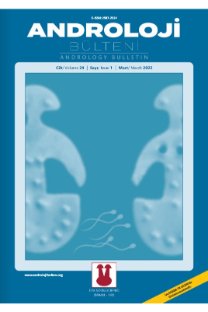İdiopatik erkek infertilitesinde antioksidan kompleks tedavinin etkinliğinin değerlendirilmesi
Evaluation of the effectiveness of antioxidant complex treatment in idiopatic male infertility
___
- 1. Öztekin U, Caniklioğlu M, Sarı S, Selmi V, Gürel A, Işıkay L. Evaluation of Male Infertility Prevalence with Clinical Outcomes in Middle Anatolian Region. Cureus 2019;11:e5122. [CrossRef]
- 2. Dong L, Zhang X, Yang F, Li J, Yu X, Li Y. Effect of oral alphalipoic acid (ALA) on the treatment of male infertility: A protocol for systematic review and meta-analysis. Medicine (Baltimore) 2019;98:e18453. [CrossRef]
- 3. Gabrielsen JS, Tanrikut C. Chronic exposures and male fertility: the impacts of environment, diet, and drug use on spermatogenesis. Andrology 2016;4:648–61. [CrossRef]
- 4. Garg H, Kumar R. Empirical Drug Therapy for Idiopathic Male Infertility: What is the New Evidence? Urology 2015;86:1065–75. [CrossRef]
- 5. Saad AB, Rjeibi I, Brahmi N, Elaloui E, Zouari N. Nicotineinduced oxidative stress, testis injury, AChE inhibition and brain damage alleviated by Mentha spicata. Inflammopharmacology 2019. [CrossRef]
- 6. Smits RM, Mackenzie-Proctor R, Yazdani A, Stankiewicz MT, Jordan V, Showell MG. Antioxidants for male subfertility. Cochrane Database Syst Rev 2019;3:CD007411. [CrossRef]
- 7. Gamidov SI, Ovchinnikov RI, Popova AY. Double-blind, randomized placebo-controlled study of efficiency and safety of complex acetyl-L-carnitine, L-carnitine fumarate and alpha-lipoic acid (Spermactin Forte) for treatment of male infertility. Urologiia 2019:62–8. [CrossRef]
- 8. World Health Organization: Laboratory manual for the examination and processing of human semen, 5th ed. WHO Press, Geneva; 2010.
- 9. Walczak-Jedrzejowska R, Wolski JK, Slowikowska-Hilczer J. The role of oxidative stress and antioxidants in male fertility. Cent European J Urol 2013;66:60–7. [CrossRef]
- 10. Aprioku JS. Pharmacology of free radicals and the impact of reactive oxygen species on the testis. J Reprod Infertil 2013;14:158–72. https://www.ncbi.nlm.nih.gov/pmc/articles/PMC3911811/ 11. Sanocka-Maciejewska D, Ciupinska M, Kurpisz M. Bacterial infection and semen quality. J Reprod Immunol 2005;67:51–6. [CrossRef]
- 12. Comhaire FH, Christophe AB, Zalata AA, Dhooge WS, Mahmoud AM, Depuydt CE. The effects of combined conventional treatment, oral antioxidants and essential fatty acids on sperm biology in subfertile men. Prostaglandins Leukot Essent Fatty Acids 2000;63:159–65. [CrossRef]
- 13. Zalata A, Hafez T, Comhaire F. Evaluation of the role of reactive oxygen species in male infertility. Hum Reprod 1995;10:1444–51. [CrossRef]
- 14. Fraga CG, Motchnik PA, Shigenaga MK, Helbock HJ, Jacob RA, Ames BN. Ascorbic acid protects against endogenous oxidative DNA damage in human sperm. Proc Natl Acad Sci U S A 1991;88:11003–6. [CrossRef]
- 15. Arafa M, Agarwal A, Majzoub A, Panner Selvam MK, Baskaran S, Henkel R, Elbardisi H. Efficacy of Antioxidant Supplementation on Conventional and Advanced Sperm Function Tests in Patients with Idiopathic Male Infertility. Antioxidants (Basel) 2020;9:219. [CrossRef]
- 16. Bassiri F, Tavalaee M, Dattilio M, Nasr-Esfahani MH. Micronutrients in Support to The Carbon Cycle Activate Antioxidant Defences and Reduce Sperm DNA Damage in Infertile Men Attending Assisted Reproductive Technology Programs: Clinical Trial Study. Int J Fertil Steril 2020;14:57–62. [CrossRef]
- 17. Pena ST Jr, Gummow B, Parker AJ, Paris D. Antioxidant supplementation mitigates DNA damage in boar (Sus scrofa domesticus) spermatozoa induced by tropical summer. PLoS One 2019;14:e0216143. [CrossRef]
- 18. Showell MG, Mackenzie-Proctor R, Brown J, Yazdani A, Stankiewicz MT, Hart RJ. Antioxidants for male subfertility. Cochrane Database Syst Rev 2014:CD007411. [CrossRef]
- 19. Majzoub A, Agarwal A. Systematic review of antioxidant types and doses in male infertility: Benefits on semen parameters, advanced sperm function, assisted reproduction and live-birth rate. Arab J Urol 2018;16:113–24. [CrossRef]
- 20. Ahmadi S, Bashiri R, Ghadiri-Anari A, Nadjarzadeh A. Antioxidant supplements and semen parameters: An evidence based review. Int J Reprod Biomed (Yazd) 2016;14:729–36. [CrossRef]
- 21. Dutta S, Majzoub A, Agarwal A. Oxidative stress and sperm function: A systematic review on evaluation and management. Arab J Urol 2019;17:87–97. [CrossRef]
- 22. Sigman M, Glass S, Campagnone J, Pryor JL. Carnitine for the treatment of idiopathic asthenospermia: a randomized, double-blind, placebo-controlled trial. Fertil Steril 2006;85:1409–14. [CrossRef]
- 23. Rolf C, Cooper TG, Yeung CH, Nieschlag E. Antioxidant treatment of patients with asthenozoospermia or moderate oligoasthenozoospermia with high-dose vitamin C and vitamin E: a randomized, placebo-controlled, double-blind study. Hum Reprod 1999;14:1028–33. [CrossRef]
- ISSN: 2587-2524
- Yayın Aralığı: Yılda 4 Sayı
- Başlangıç: 1999
- Yayıncı: Turgay Arık
Akut ve kronik bakteriyel prostatit olgularında tedavi yaklaşımları
2866 Semen analiz raporunda, yaş faktörünün semen değerleri üzerine olası etkisinin araştırılması
Elif KERVANCIOĞLU DEMİRCİ, Gülnaz KERVANCIOĞLU, Şiir YILDIRIM, Gonca Yetkin YILDIRIM, İbrahim POLAT
Penil doppler ultrasonografi: Teknik ve yorumlama
İdiopatik erkek infertilitesinde antioksidan kompleks tedavinin etkinliğinin değerlendirilmesi
Sağlık hizmetleri öğrencilerinin meme kanseri konusunda bilgilerinin değerlendirilmesi
Pelin PALAS KARACA, Refika GENÇ KOYUCU
Tedavi sürecinde vajinismus erkeğinin yönetimi
Niyazi Umut ÖZDEMİR, Emre ÇİYDEM
Primer ve sekonder erkek infertilitesinin erektil fonksiyon ile ilişkisi
Menopoz ve andropoz: Benzerlikler ve farklılıklar
Okan VARDAR, SEVGİ ÖZKAN, PINAR SERÇEKUŞ AK
İnfertil çiftlerde cinsel yaşam ile ilgili araştırmaların sistematik derlemesi
